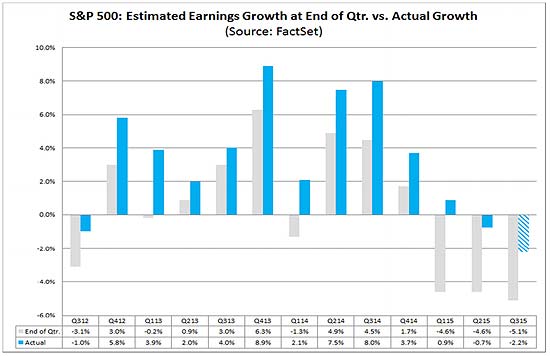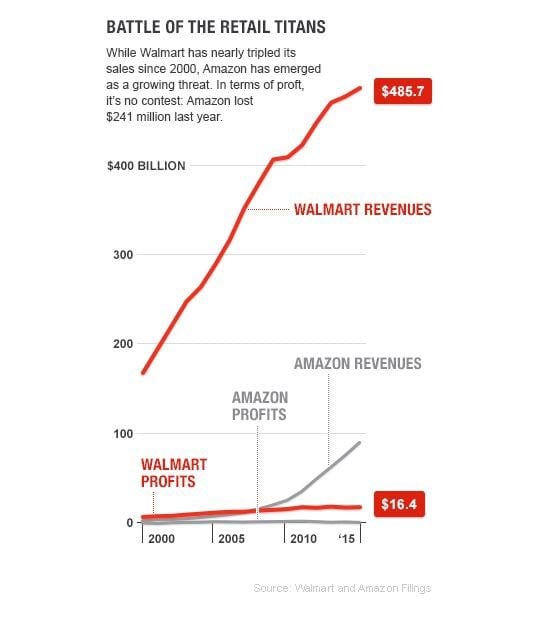Wal-Mart Stores Inc. (NYSE: WMT) had its market value wiped out by $18 billion this past Wednesday after senior management revealed the company may suffer a 6% to 12% earnings drop in 2017.
The actual story here, however, has nothing to do with the company itself.
Conventional wisdom would have you believe that Wal-Mart is a unique situation and the lowered expectations are about everything from compressed margins to the fact that Amazon.com Inc. (Nasdaq: AMZN) is eating Wal-Mart's lunch.
All of those things are true.
Analysts like Morningstar's Ken Perkins noted that the sell-off is an "overreaction and a buying opportunity."
That may also be true, but again, the story isn't about Wal-Mart.
Instead, it's about a change in market tenor - both for Wal-Mart and for the stock market.
You see, this has everything to do with a fundamental shift in market conditions that's going to catch millions of investors by surprise this earnings season.
My job is to make sure you and your money come out on the right side of the equation - so let's get cracking! Here's what you need to know about today's markets...
Wal-Mart's Double-Digit Dive Reflects a New Era in Markets
There's been a meme since the financial crisis began: what's bad is good and what's good is bad.
The basic drift is that any bit of bad news is actually good because it implies further Fed involvement in the markets and lower interest rates. That's why the markets have moved higher since 2009 on bad jobs data, terrible consumer confidence, and falling economic numbers. That's also why the markets have tanked on even the smallest bits of good news - a signal that traders believed would hasten the Fed's exit.
But now that the Fed has taken a "damn the torpedoes" approach to raising rates, the markets have begun to recognize that bad news is actually bad news - not the good news it was a few months ago.
And that, in turn, brings the focus squarely back to earnings, or in this case, earnings potential at a time when earnings are being revised lower faster than Tom Brady (allegedly) deflated his footballs.
This season, for example, the S&P 500 is expected to report an average year-over-year earnings decline of 5.5% for Q3, according to FactSet.
That's what makes this so dangerous.
When S&P 500 companies report earnings that are above earnings estimate, the overall growth rate goes up because actual earnings numbers replaced lower estimated numbers. But the converse is true, too. Reported declines negatively impact actual growth rates which, as you can see below, are already decelerating sharply.
I honestly don't know why this is such a surprise to most investors.
Earnings - above all else - are the single strongest predictor of stock prices over time. If there's a decline in the works as I think there is, it will be the first back-to-back series of earnings declines since 2009.
The fact that Wal-Mart is talking about 2017 implies another four to six quarters of negative growth. Only two quarters are required for a recession.
And that is really what unhinged traders.
Profit growth has never been this weak except in a recession. And that, in turn, means any company - not just Wal-Mart - that misses earnings or lowers expectations is at risk of a similar shellacking in the weeks ahead.
The other thing to keep in mind is that investors who have historically paid up for value have been paying up for growth in recent years. The fact that they clobbered a long-venerated name like Wal-Mart based on nothing more than expectations suggests a rising level of desperation, not stability.
To put this in context, Amazon's fiscal 2016 earnings are expected to grow by 211% on growth of nearly 20%, according to S&P Capital IQ. Wal-Mart's are going to fall by 6% to 12% at a time when revenue has flattened. That means Amazon is more "valuable" than Wal-Mart even though the former has only one-fourth the revenue. The irony, of course, is striking; Amazon is perennially unprofitable or just barely profitable.
And finally, the Wal-Mart situation confirms something we've talked about many times.
Companies that base their profits on unsustainable price and cost strategies will eventually pay a terrible price. You can't over-earn for long because eventually expectations catch up with reality.
It makes me wonder if Wal-Mart is going to be more like Twitter Inc. (NYSE: TWTR) than Target Corp. (NYSE: TGT), at least in terms of its stock price anyway.
There are a few key takeaways here:
- More than 100 million Americans shop at Wal-Mart weekly, so the dramatic drop in earnings projections tells me that the middle class is in more trouble than previously acknowledged and that the recovery Washington thinks is moving along is actually shifting into reverse.
- People have almost completely overlooked the fact that Wal-Mart's CFO, Charles Holley, specifically called out the $1.5 billion being spent on increased wages and training as a causal factor in his remarks. That's proof positive that the increased wages everybody's been screaming about in politically charged circles do have a very real effect on bottom line earnings, and it's not good. I pointed this out to you last June while describing the most pressing reason yet to avoid retail stocks.
- Traders are calling the Fed's bluff while at the same time meting out severe punishment for any company that dares to go against the officially accepted party line and declare the "emperor has no clothes," as Wal-Mart has effectively done here. This signals a shift to more speculative trading and even higher volatility ahead. The "must-haves" we talk about are going to be your security blanket because of the inherent stability they offer.
- Any business that fails to acknowledge the disruptive power of competing technologies, specifically as they relate to e-commerce, will lose its cost advantage and may never Instead of dominating the industries they created, they will turn into followers and, if they're lucky, survivors. Many will go out of business or suffer a BlackBerry-like fate as customers "pull" from their favorite retailers rather than accept what's "pushed" upon them by traditional retailers.
Wal-Mart proponents will no doubt offer plenty of resistance.
The "hit" will be worth it, they'll say. The "investments in people and technology will pay off eventually" counter.
Perhaps.
But ask yourself if you have a decade or more to wait if you want to buy shares.
That's how long it's taken Kroger Co. (NYSE: KR) and CostCo Wholesale Corp. (Nasdaq: COST) to recover from similar resets, according to Charles Grom of Sterne Agee.
Keith has discovered a small-cap company that's poised to deliver 720% gains as it saves California from their present state of crisis. Click here to get full access to Keith's exclusive briefing and all of his Total Wealth Research at no charge.
Join the conversation. Follow Keith on Facebook and Twitter.
About the Author
Keith is a seasoned market analyst and professional trader with more than 37 years of global experience. He is one of very few experts to correctly see both the dot.bomb crisis and the ongoing financial crisis coming ahead of time - and one of even fewer to help millions of investors around the world successfully navigate them both. Forbes hailed him as a "Market Visionary." He is a regular on FOX Business News and Yahoo! Finance, and his observations have been featured in Bloomberg, The Wall Street Journal, WIRED, and MarketWatch. Keith previously led The Money Map Report, Money Map's flagship newsletter, as Chief Investment Strategist, from 20007 to 2020. Keith holds a BS in management and finance from Skidmore College and an MS in international finance (with a focus on Japanese business science) from Chaminade University. He regularly travels the world in search of investment opportunities others don't yet see or understand.





